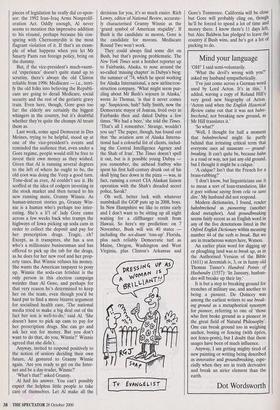Mind your language
`OH!' I said semi-voluntarily.
`What the devil's wrong with you?' asked my husband sympathetically.
`I've just come across a German word used by Lord Acton. It's in this,' I added, waving a copy of Roland Hill's very good new biography of Acton. 'Acton said when the English Historical Review came out that it was not bahn- brechend, not breaking new ground, as Mr Hill translates it.'
`So what?'
`Well, I thought for half a moment that bahnbrechend might lie partly behind that irritating critical term that everyone uses ad nauseam — ground- breaking. It can't quite be, because bahn is a road or way, not just any old ground, but I thought it might be a calque.'
`A calque? Isn't that the French for a brass-rubbing?'
`I don't know, but linguisticians use it to mean a sort of loan-translation, like it goes without saying from cela va sans dire.' My husband did not respond.
Modern dictionaries, I found, render bahnbrechend as pioneering (another dead metaphor). And groundbreaking seems fairly recent as an English word in any of the five denotations listed in the Oxford English Dictionary within meaning number 44 of the verb to break. But we are in treacherous waters here, Watson.
An earlier plain word for digging up or ploughing land was to break up, as in the Authorised Version of the Bible (1611) at Jeremiah iv, 3, or in funny old Thomas Tusser's Hundred Points of Husbandry (1557): 'In January, husban- des will breake up their lay.'
It is but a step to breaking ground for trenches of military use, and another to being a pioneer. De Quincey was among the earliest writers to use break- ing ground as a metaphorical synonym for pioneer, referring to one of 'those who first broke ground as a pioneer in the great field of Natural Philosophy'. One can break ground too in weighing anchor, boxing or fencing (with epées, not fence-posts), but I doubt that these usages have been of much influence.
Anyway, I am getting mighty tired of new painting or writing being described as innovative and groundbreaking, espe- cially when they are in truth derivative and break an airier element than the earth.
Dot Wordsworth


























































































 Previous page
Previous page